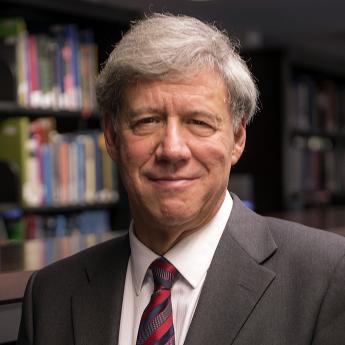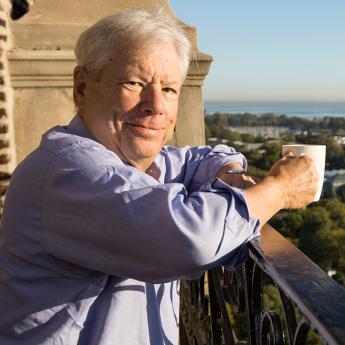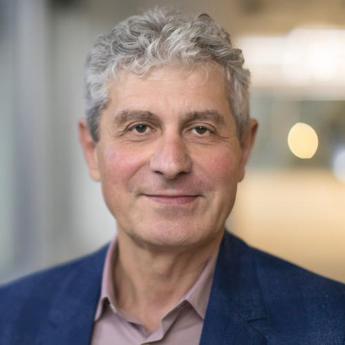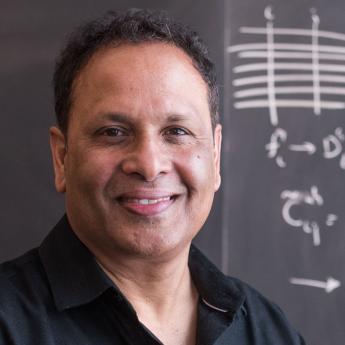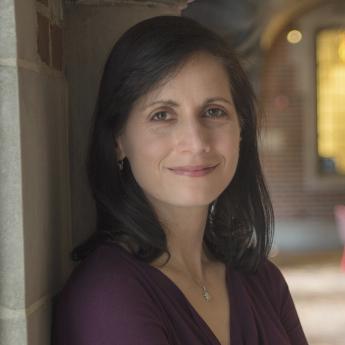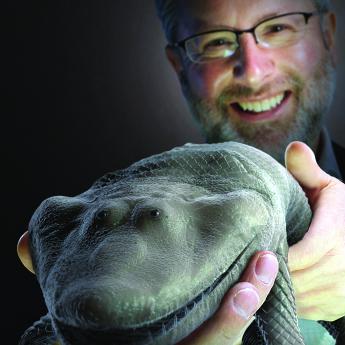Show Notes
Over his distinguished career, Nobel Prize-winning economist James Heckman has dedicated his research to understanding and solving the problem of inequality. He has closely studied how investing in early childhood development is linked to better outcomes—from higher earnings, to violence reduction, and even breaking the cycle of poverty.
His groundbreaking research has been applied across the globe—from Jamaica to Denmark and China, and it has given policymakers important insights into education, job-training programs, minimum wage legislation and more. His most recent work has centered on examining social mobility, and he’s help found an entire field on the economics of human flourishing.
Heckman is the Henry Schultz Distinguished Service Professor in Economics at the University of Chicago, where he has been a faculty member since 1973. He directs the Center for the Economics of Human Development.
Subscribe to Big Brains on Apple Podcasts, Stitcher and Spotify.
(Episode published April 13, 2023)
Subscribe to the Big Brains newsletter.
Please rate and review the Big Brains podcast.
Related:
- Family background shapes children’s lives despite different social policies in U.S., Denmark—UChicago News
- Social mobility across generations may be substantially overstated, study shows—UChicago News
- What's Not On The Test: The Overlooked Factors That Determine Success—NPR
- Why Progressives Are Wrong to Long for Danish Welfare—Newsweek
- Inaccurate reporting on social inequality makes matters worse—The Hill
Transcript:
Paul Rand: The American Dream. It’s a phrase so overused that most of us have forgotten it meant something specific in the past, that it’s possible, with hard work, for your kids to lead a better life than you had. But in a recent poll from NORC here at the University of Chicago, it appears as though most Americans think that that dream is already gone.
Tape: So a new Wall Street Journal-NORC Poll shows America is pulling back from its traditional values while losing confidence in the economy. 47% of Americans say it will get only worse, with 54% describing it as poor. When asked if they felt that life for their children’s generation will be better than their own, 78% said they were not so confident.
Paul Rand: It’s easy to understand why so many people feel this way. Just look at the levels of wealth and income inequality in our economy.
Tape: Anger over economic inequality and its effects is an important theme running through our national politics in both parties right now.
Tape: The growing gap between rich and poor Americans is one of the biggest challenges facing the country. Get this, the richest 1% controls more wealth now than in any time in more than a half century.
James Heckman: Well, there’s been a lot of discussion of inequality.
Paul Rand: That’s James Heckman. He’s been an economist at the University of Chicago since 1973. He’s one of the founders of the Harris School of Public Policy, and he’s also a recipient of a Nobel Prize. His career has focused on the problem of inequality and how to best solve it.
James Heckman: What you see is this sorting process that’s probably getting stronger and stronger in American society, these community effects which we typically ignore. Peer effects are playing a major role, and that’s what I’m working on. That’s if we really want to tackle inequality, we really need to think more about social inclusion.
Paul Rand: Heckman runs the Center for the Economics of Human Development at UChicago, and has dedicated his research career to figuring out what holds people back in our economy and what we can do to help them thrive. He’s basically one of the founders of an entire field, the Economics of Human Flourishing.
James Heckman: The role of the parents, the role of course, academic education and peer interactions, the notion of social interactions, that came into economics, but later.
Paul Rand: If we want to address inequality, we’re going to have to understand the science of what leads people to be successful in our economy and how we can give more people those skills. Heckman believes his research may hold the answers.
James Heckman: The positive news was that the intervention seemed to be having a real effect. So then I started studying the interventions and I went into that area. I read them, and I said, “There’s hope here.”
Paul Rand: The research over his entire career has all pointed in one direction: the importance of early childhood education.
James Heckman: We’re building the brains and we’re creating the capacities that’ll go through and carry you through the rest of your life.
Paul Rand: Welcome to Big Brains. We translate the biggest ideas in complex discoveries into digestible brain food. Big brains, little bites. From the University of Chicago Podcast Network, I’m your host, Paul Rand. On today’s episode, inequality and the economics of human development.
Paul Rand: As I look at all of your work, it almost seems like that the concept of this falls under the idea of the economics of human flourishing. And I wonder, if you are going to describe what human flourishing means, how would you talk about that?
James Heckman: Well, human flourishing, it’s really asking and describing how people can blossom and fulfill, I wouldn’t say destiny, but to fulfill their capacities and be the best they can be at what they want to be. So I would say flourishing is essentially a state of life. People would say success, although success is obviously a subjective thing, and it depends on values, but I would say making use of your talents, making use of your skills and pursuing your interests, and pursuing the values that you hold dear. So I’m making it sound like some exhilarating adventure where you’re climbing Mount Everest. Could be a version of that, but it’s more like even, for example, a really good automotive worker at a plant where there might be some encouragement for us saying, “How can I make a better car? Or how can I do a better way at organizing the factory floor or working with my fellow peers?”
James Heckman: I think that’s the kind of flourishing I’m talking about. So it has both a social and a personal component, and the social component is its contribution to society, to the family, as well as to the economy. And so it’s a larger issue than just personal fulfillment, if you want to think of it that way.
Paul Rand: Well, you also talk about it in terms of, I guess this idea of understanding the skills that are needed to be successful in our economy. And I wonder if you can articulate, what are those skills, and I guess as importantly, how do you study them?
James Heckman: Well, the one thing that I learned, I mean I’ve been an economist now for quite a while, as you can tell, and there used to be this concept called human capital. And it was a vague term that covered everything. And I remember telling the people, I thought it was a little bit like 19th century ether. They could say, “Well, it’s here, it’s there. It’s this universal substance.” But then we got much more specific in understanding exactly social and emotional skills and how those skills were produced in workplaces, at home, and we can measure those skills. I can give you a list of them. Things like executive functioning, the ability to control yourself and the ability to manage anger, and the ability to remember short term statements that have just been made and staying on the task and being resilient.
James Heckman: So each of these, we understood much greater than we did before. So unfortunately, world banks and large scale organizations are only slow to get to this. So that’s where the synthesis of biology, epidemiology, genetics, neuroscience as well as economics, sociology, and other social sciences plays a huge role in trying to understand exactly what we can do to shape and help people, especially disadvantaged people, but also just people generally, how to live longer and richer lives.
Paul Rand: But that requires a system that fosters these important non-cognitive skills. The question is, how do you build that system?
James Heckman: When I came into economics, there was a big discussion, a big debate of whether or not schooling had any effect. This was in the 1960s, and the debate, well, schooling is not really anything but just an expression of ability. You don’t go, only thing schooling does is it reveals your ability. That was a big discussion when I entered economics. This early work was very negative about the possibility of changing human endowments, and then if there was any endowment, it was IQ, and that that was genetically determined.
Paul Rand: Heckman set out to prove that story wrong.
James Heckman: Back in the 1990s, I was doing a lot of work on job training programs and on the so-called GED programs. These are programs that were designed to take adolescents who dropped out of school and promote them and give them a second chance. And what I found increasingly in those programs, a number of studies, experimental and non-experimental, I spent a lot of time on this, wrote many papers, I got very discouraged because in general, except for young women who got pregnant and had to drop out of school, those programs were not effective. They just weren’t working. They were not giving higher earnings, they were not reducing crime. And so I got very discouraged thinking, well, there’s not much we can do. And then I found something at about the same time.
Paul Rand: Maybe the problem wasn’t the focus of these programs, but the late age at which they were intervening in the lives of the participants.
James Heckman: Namely, I became aware of these early childhood programs.
Paul Rand: Heckman uncovered a series of programs from the 1960s and seventies that had gone overlooked for decades, and-
James Heckman: What I found was that looking at these programs, I saw some hope and promise that I have not seen in the job training programs.
Paul Rand: One of these was the Perry Preschool Program.
Tape: These children are three and four year olds. They are participating in a preschool experiment. These kids come from low income homes. [inaudible 00:09:00] the director of the project from its inception in 1967 to its completion in 1970.
Paul Rand: It was a randomized study that looked at how interventions in the classroom and at-home visits in early childhood could positively affect the IQ of at-risk kids.
Tape: In all of three programs, we added the home teaching because we felt that unless the mother was included in some way, she could not provide the support to the child that would be necessary in the years we were working with him, and perhaps even more importantly, as he went through school.
Paul Rand: And surprisingly, it was based on exactly the non-cognitive skills that Heckman was interested in.
Tape: For example, the children were expected to talk with the teachers and the other kids. The children were also expected to reflect on what they were doing, to think before acting, to attend the things they had selected to do. And they were encouraged to complete what they had begun.
James Heckman: So I got deeply interested in that. I started working with these people who developed these early studies. I didn’t develop them. Perry Preschool was developed in 1960s, in Ypsilanti, Michigan.
Paul Rand: Since that time, the project has largely been cast aside as a failure. The results had entirely focused on IQ outcomes and then the results didn’t pan out as hoped.
James Heckman: Well, the kids in the program had real boosts in IQ, but by age 10, the IQ of the kids in the program was no different from that of kids in the control group.
Paul Rand: But?
James Heckman: I started looking at the original data. It’s because I was skeptical. I’m an economist, I do a lot of work in econometrics. I looked at the studies that I read and they just seemed a little flaky. They were using only measures of what they thought to be IQ. And I said, “Okay, you get a fade out.” But then I pointed out, they’re still graduating in high school at a higher rate, they’re still going to much less crime. They’re still going forward in employment. And it turns out as we followed these children and we followed them now into their mid-fifties, and we followed their children as well, but what we saw was real beneficial effects, less crime, more education, actually more stable family lives. They were producing earnings that were significant. And we have actually followed those original Perry children up to 55 now, and we followed their children. And what we found is those children born of parents who were in the program experienced better home lives, more two parent families, more income, and they grew up to commit less crime themselves, and their parents committed less crime.
Paul Rand: It turns out the skills that Heckman had been arguing were more important than IQ really did lead to better flourishing.
James Heckman: We need to think more than just IQ, more than just cognition. And so you’ll get these non-so-called social and emotional, sometimes called soft skills, those skills played a huge role in explaining these results. So that got me very excited, that led me to think for a while that what we should do is think about these programs as a way of essentially addressing these problems, that if you build a skill base now, it makes it much easier to learn later. So that even if kids started off with a bad initial condition, you could build the skills so that when they got to be teenagers, they would actually then be able to take advantage of schooling and everything that life has to offer.
Paul Rand: The results of Heckman’s reexamine of this decades old program even made their way to the Senate floor. In his 2013 State of the Union address, Barack Obama cited Heckman’s cost benefit analysis of the program.
Tape: Every dollar we invest in high quality early childhood education can save more than $7 later on by boosting graduation rates, reducing teen pregnancy, even reducing violent crime.
Paul Rand: The Perry Preschool Project wasn’t the only program Heckman reevaluated. He also came across the Carolina Abecedarian and Approach to Responsive Education Projects or ABC Care for short. These programs also provided interventions for disadvantaged kids and home visits for their parents. The results were the same as with Perry Preschool Plus.
James Heckman: With ABC, we also measured the health benefits, and we saw that people who were in this program, even though their IQs hadn’t been any higher, were much healthier, were much ... And they were doing all these kinds of self-management. So this goes back to the executive functioning and the ability to control one’s life. So it turned out they had lower blood pressure, much less likely to get diabetes, less obesity. In many different dimensions, these kids were very successful. And it wasn’t targeted as a health program. Health was a byproduct, but it was a byproduct of these social and emotional skills. So once we built into them, this notion of self-control, gave them those capacities, they took advantage of it, and they led healthier lives. So we followed them and we found even bigger benefit costs when we included this, say the reduction in the health costs for these children, as we followed them over their adult lives.
Paul Rand: But what was it exactly about these programs that worked so well? Heckman thinks he may have found an answer. That’s after the break. Have you ever wondered who you are but didn’t know who to ask? Well then join Professor Eric Oliver as he poses the nine most essential questions for knowing yourself to some of humanity’s wisest and most interesting people. Nine questions with Eric Oliver, part of the University of Chicago Podcast Network.
Paul Rand:The Perry Preschool and a ABC Care project proved the importance of these non-cognitive skills for flourishing in our economy. But with so many interventions going on in the program, pinpointing what exactly was having the most benefit is difficult. Heckman compares it to the famous story of Marie Curie isolating radium.
James Heckman: Think about this, the big mystery in 1890, I guess Henri Becquerel found that he put a photographic plate in a drawer and it showed some razor coming out of this material, this pitchblende. And the question is, what caused the pitchblende to leave those rays? And Madam Curie and her husband isolated radium.
Paul Rand: Radium and isolating the most powerful casual mechanisms, the radium of childhood development, is important. Because as Heckman’s most recent work shows, large scale expensive government programs without an isolated mechanism don’t seem to work.
James Heckman: One of the issues I’ve worked on a lot that I’m very passionately working on, and I’m trying to understand the full consequence, I wrote some work with a colleague in Denmark, a guy named Rasmus Landersø. What we found was something that staggered me. I was comparing social mobility rates in the United States with that in Denmark. The goal that I wanted to see was how much more improvement in social mobility did we find in Denmark over the US, and what we could attribute that to, what part of the Danish welfare estate? Denmark has a very full welfare estate. So if you go to Bernie Sanders websites and Hillary Clinton, and many people, we’re not talking just Democrats, we’re talking people who are in the middle. I bet you Romney would have this as well. And what they say is, “Look, the Danes have this universal childcare. It has access to health and schooling is equalized in the sense that the disparities that we see in schooling expenditures across geographic areas that are real in the United States are not present in Denmark.”
James Heckman: That there really is a sense of a very generous childcare leads for both father and mother, very generous supplements, all universal preschool and on and on and on. So it’s a very fully funded welfare state, and it very much operates in principles of egalitarian bureaucracy that people have equal access. And there’s no question they do. But nonetheless, what we found is something that staggered me and we’re still working on, namely, we found that we looked at the mobility, how much, if you look at the income of the parents, and you looked at the later income of the children, how highly dependent they were in Denmark versus the US. And you know what we found? That the US and the Denmark were basically identical, despite this much bigger welfare estate.
Paul Rand: In terms of mobility of the children, you’re talking about?
James Heckman: The very kind of social mobility that people like the New York Times, a lot of people, are pushing. They’re talking about how this is not the land of opportunity. And that was true whether or not you had education as the measure, education of the father, education of the son, or if you had education of the parents. That’s staggering.
Paul Rand: So what was it about the Perry and ABC programs that led to these results that Denmark’s large scale benefits seem to miss? Heckman thinks an answer can be found in Jamaica during the 1980s, and the story revolves around a person he calls the Madame Curie of childhood development.
James Heckman: I became aware of a program in Jamaica called Jamaica, Reach Up and Learn. This is pioneered by an epidemiologist from London, Sally Grantham McGregor, now Dame Sally Grantham McGregor. She was trained at the University of College London in Epidemiology.
Paul Rand: Back in what year, approximately?
James Heckman: This was 1985. Okay. She was living in Jamaica. Her husband was a Jamaican, she was a native Brit. They ran this experiment that ended up in the Kingston slums, and it showed insight, which I think is the most important insight that I’ve learned and something I’m contributing to now, I hope. If you visited the parents of the children one hour a week, not even looking at the kids, it’s looking at the parents, and you gave them materials or you gave them the knowledge to take materials, so low cost materials, nothing fancy, and teaching the parents their valuable role in talking to the child, playing with the child.
James Heckman: So a typical exercise would be look, make a scrapbook with the kid. And so go out and look at them and say, “Okay, there’s Mr. Jones. Mr. Jones is walking down the street with his dog. So draw a picture of Mr. Jones or do this do.” And so we started, again, this is the same way I wandered into it. I’m the analytical economist. I looked at their data. They hadn’t analyzed it very clearly. So we took the data, we co-authored with them, we’re still co-authoring with them. And what we found is substantial benefits now through age 35, of the children who were in the program versus those who were not. So we followed those programs out for, again, as I say, 35 years. We find very strong effects.
Paul Rand: Wow. OK.
James Heckman: Sally Grantham McGregor is somebody who actually isolated. To my way, she’s like a Madame Currie figure. And she isolated it by just saying that’s all she could afford to do. She couldn’t do all the other things that these programs do. And by doing that, it seemed like that was the secret sauce, was the warmth of the parenting, the enhanced parenting activity. So we said, “Okay, that’s interesting.”
Paul Rand: And of course, both Perry and ABC Care had home visit programs.
Tape: Almost inevitably, this becomes the most important thing the teacher does. All of our teachers have become very enthused about home teaching. And after getting over the initial fear of getting out of the classroom and out of the safety of the school and into the home, into the mother’s domain, nearly all of our teachers have found this the most rewarding part of their work.
James Heckman: I realized the radium analogy is probably overstated, but I think it’s appropriate. What we came to understand was how when family life was compromised, skill development and human development was compromised. We’re finding radium, I think. This is close to it.
Paul Rand: Heckman also thinks this focus on the role of the parents can explain the results from the Denmark study as well.
James Heckman: And I’m convinced now, and I’m convinced in the sense, I’m working on this with several students here at Chicago and with Rasmus and Copenhagen, that what we’re finding is this social process of sorting and pure effects, which is intrinsic to a modern society, is playing a huge role. Namely, that you see more educated people are sorting together, more educated men are marrying more educated women. And therefore as a result, because men and women are working and because education produces income, those more educated families are the ones having higher income and therefore, they provide an influence at home on the children that is lacking for the less educated and the whole communities they sort to.
James Heckman: So now we’re getting families that are very unstable. We have a much greater challenge for families. And it’s not just in the US, it’s true in Brazil, it’s true in South Africa, it’s true in Russia. It’s true in a lot of countries. And so what that means then is the challenge is great, that asking the school to address the problems that largely originate with the family is asking too much. And I think we just don’t accept that.
Paul Rand: Addressing inequality is a complicated and complex business, and we don’t have infinite resources to throw at the problem. Heckman says it’s important we use the resources we have in the most cost-effective way.
James Heckman: So right now in Chicago, we have something called Educare. They spend 30 to $35,000 a year on educating each child. That’s per child cost. Very expensive. And they give nurses, they get nice computer facilities, they have very elegant buildings, and it’s clean and safe and everything you’d ever want. What the Jamaicans did though was something very different. It’s about $500 a year as opposed to $35,000 a year. So we’re talking vastly cheaper.
Paul Rand: Heckman believes that focusing resources toward parents may be the best answer to get us through the problem, but.
James Heckman: What I’m saying now is controversial because many people are invested in their programs and they’re very unhappy with what I’m telling you right now because I’m telling you, look, we can do something on the cheap that you don’t need these elaborate technologies for. Believe it or not, when Biden and the group was trying to talk about Build Back Better, I tried to get them to acknowledge that comparison between the US and Denmark. They were really saying, “Denmark is the model, let’s build it.” And that was what Build Back Better did. And I said, “Look, I mean, I have some data, and if we’re really going to cast it in an honest way, let’s think about the ways that we improve family life to actually promote social mobility, especially among disadvantaged families.” And they wouldn’t go there, they just wouldn’t. And I think a lot of the people thought I was a traitor to the cause because I was talking about it. They did. They really did. They deeply disliked me.
James Heckman: I know the head of the Council of Economic Advisors was very upset, I think, with me in the end. We talked the length about this, but because I couldn’t endorse it, because I said, “You’re really not getting to the essence of what we know.” It’s not just universal childcare. It’s not just ... These features are maybe useful to have, but it’s not. And the other part was the fact that I was emphasizing the family, and so they wouldn’t go that far with me. But I did agree with them, and my own data supported that, I didn’t refute my data, that those programs had been effective and that if applied to disadvantaged populations, they would’ve been effective. So that didn’t contradict.
James Heckman: I’m just trying to get it down to the essence because the cost of a lot of these programs is staggering, especially when it’s borne by local communities or philanthropies, and the fact that we can get a much cheaper version. 35,000 versus 500 is quite a comedown in terms of cost and the benefits in terms of social, emotional and cognitive skills of these very low cost home visiting programs are on par with these far more expensive programs.
Paul Rand: Heckman and his team have been expanding the low cost home visiting program across the world’s, most recently in China.
James Heckman: So I got to be an advisor in with a group in China, China Development Research Foundation. The Chinese were interested in a program that could be effectively targeted in rural China. And we decided well, we were going to run a version of the Jamaican program in rural China, and in this case take much finer data collection, so we can look at the growth of skills, week by week by week. And the home visitors, by the way, are not trained PhDs. They’re not MAs, they’re not even college graduates. The home visitors are people who are barely more education than the mother they’re visiting. They’ve been trained by more educated people, but they’re of those people. One of the biggest dangers when you get into family life is by talking down to people and telling them, “Here are the superiors teaching you how to raise your kids, and we know better than you.”
James Heckman: No, this is basically just offering advice. It’s always voluntary. It’s always respecting people and respecting their authority and respecting that, period. And we also saw that it helped introduce the programming in Tibet. And so I’m doing a lot of work on the skill growth with a person here named Jin Zhou. So Jin Zhou and I went out to Lassa. We went out a hundred miles west of Lassa, went out into this area. This is almost a stereotype of what you think of in Tibet. So what we did, we saw the Tibetan visitor, it was amazing. She came in, she worked with a parent, and the parent was very happy. The kid was happy to see the visitor. They would do things. They were singing songs in Tibetan, but was very, very ... We looked down on the yard and the yaks were feeding there. It was all very, very colorful, but it was actually very inspiring because we could see very positive results, but it’s early days. We’ve only gone out three, four years. We’re going to get a follow-up.
Paul Rand: They’re also bringing this program to Chicago, where it will be called Preparing for Life.
James Heckman: We’re going out of the so-called back of the Yards area in Chicago. So we’ve raised some money. We’re looking to raise other sums to go in. And so we’ll do both analytical studies like we’re doing in China where we look at growth profiles, but we’re also in development profiles, but also literally working with neighborhoods.
Paul Rand: If I’m talking to parents and they’re listening and they’re saying, “Well, gosh, what do I do? What am I supposed to take away from this?” What would you tell them?
James Heckman: Well, I think what I would tell them is that they underestimate the value they have in training their children, and in producing knowledge, and producing what children become. That parents, I think, typically don’t understand their power. And that’s been the secret of these home visiting programs, getting the parents to engage more with the children. And a lot of middle class families do that, so I’m not saying that it’s universal, but a lot of disadvantaged families don’t. It sounds obvious, but it’s not. For example, I have a student now, a former student who’s at Rice, very brilliant guy, and what he’s found is that when you ask parents from disadvantaged backgrounds particularly, what do you think should be a normal trajectory for a child? At what age should the child be speaking, walking, doing the kind of thing? Most middle class parents will tell you that immediately. They’ll have an agenda, a growth curve, they’ll have everything carefully charted out.
James Heckman: A lot of disadvantaged parents don’t really understand the important role that they can play and what to expect of their children and how useful it is for the child for them to help and engage. We’re talking about human flourishing. These people are flourishing as parents. They are themselves energizing their role, and they realize they, more than the school, will play the role of helping to improve their children’s lives.
Tape: Big Brains is a production of the University of Chicago Podcast Network. If you like what you heard, please leave us a rating and review. The show is hosted by Paul M. Rand and produced by me, Matt Hodapp and Lea Ceasrine. Thanks for listening.
Episode List
SCOTUS Nears Unimaginable Era with Geoffrey Stone (Ep. 8)
Legal scholar Geoffrey Stone discusses why we are on the verge of an unimaginable era for the Supreme Court, the forgotten history of Roe v. Wade and free expression on college campuses.
Economist’s Journey to the Nobel with Richard Thaler (Ep. 7)
Richard Thaler discusses how a bowl of cashews inspired his early research, how he missed a 4 a.m. Nobel wakeup call from Sweden, and what it was like to act in a movie alongside Selena Gomez.
Future of Energy Innovation with Michael Polsky (Ep. 6)
In this alumni edition of Big Brains, Michael Polsky discusses his early days in the energy field, his current project to build one of the largest wind farms in the world and why he believes in the power of innovation.
The Expanding Universe with Wendy Freedman (Ep. 5)
Prof. Wendy Freedman discusses her research on measuring the age of the universe, her leadership of the Giant Magellan Telescope and the search for life outside our solar system.
Nature’s Design Secrets with Rama Ranganathan (Ep. 4)
Prof. Rama Ranganathan shares his pioneering research on evolutionary physics, and explains why he believes biology is at a similar point today as engineering was two centuries ago during the Industrial Revolution.
Mind of a Virtuoso Composer with Augusta Read Thomas (Ep. 3)
Prof. Augusta Read Thomas gives a glimpse into the creative process of a world-class composer, discusses the state of classical music today and how she helps train the next generation of composers.
Myths of U.S. Health Care with Katherine Baicker (Ep. 2)
Prof. Katherine Baicker discusses research on the true costs and benefits of expanding health care, dispelling a number of myths, and provides insights into how to improve health care for all.
Discovering the Missing Link with Neil Shubin (Ep. 1)
Prof. Neil Shubin discusses his discovery of Tiktaalik roseae, the 375-million-year-old fossil that was a missing link between sea and land animals—and what it meant for the understanding of human evolution and how it has impacted the future of genetic research.


